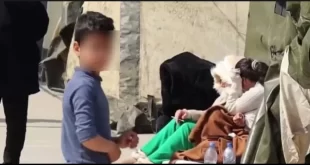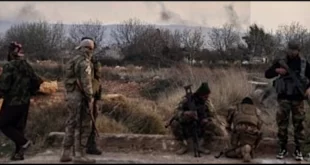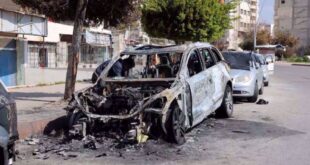September 03, 2013, Global Research
France’s intelligence services released a perfunctory, eight-page brief for war with Syria yesterday, as Socialist Party (PS) Prime Minister Jean-Marc Ayrault met with leaders of France’s right-wing opposition parties to press them to support President François Hollande’s war drive.
Hollande’s intelligence brief is a collection of already-discredited lies, non sequiturs, and unsupported claims. Reviewing it makes clear that Hollande’s charges against the Syrian regime are as unsubstantiated as those of British Prime Minister David Cameron, who suffered a humiliating defeat when he tried to obtain parliamentary approval for war in Syria last week.
The document’s central claim is that Syrian President Bashar al-Assad used chemical weapons “notably sarin, in limited attacks against his own people, in particular in April 2013. Intelligence available to us today leads us to estimate that on August 21, 2013, the Syrian regime launched attacks on certain neighborhoods of the Damascus suburbs held by opposition units, with both conventional weapons and the massive use of chemical agents.”
The first lie, that Assad regime forces used chemical weapons in the cities of Saraqeb and Jobar in April, has already been refuted by UN inspector Carla del Ponte. In May, based on UN investigations on the ground in Syria, she stated that the US-backed opposition was responsible for the use of chemical weapons (see: “UN says US-backed opposition, not Syrian regime, used poison gas”). Separately, Turkish authorities found that Syrian opposition fighters in Turkey possessed quantities of sarin gas.
The French brief neither mentions nor attempts to refute these findings, but simply covers up evidence that Al Qaeda-linked forces among its own proxies are responsible for the chemical weapons attacks, both in April and in August.
After spending four pages on details about the composition and command structure of Syria’s chemical weapons forces—that do nothing to show that Assad actually used these weapons—the brief turns to the alleged August 21 attack in Ghouta. Citing “47 original videos” and “other independent evaluations, such as those by Doctors without Borders,” it concludes that reports of events in Ghouta were consistent with Syrian chemical attack. It cites “credible intelligence from many partners” that chemical weapons were part of a Syrian regime attack plan.
It concludes by asserting, “No group in the Syrian opposition currently has the capacity to stock and use such agents, a fortiori in quantities like those deployed on the night of August 21, 2013 in Damascus.”
None of these claims have any credibility. Firstly, the brief was published after first reports emerged of opposition forces claiming responsibility for chemical attacks in Damascus in August—reports that, again, the brief does not address (see: “Report links US-backed Syrian opposition to Ghouta gas attack”). Nor does the brief give any information about the sources of the videos or the “partners” who have given it intelligence.
These “partners” could be the CIA, the Saudi regime, or Al Qaeda-linked forces in Syria—all of which have a vested interest in provoking a war with Syria and a record of lying about major events.
As for the Doctors without Borders organization, it is hardly an “independent” source. It has a long history of ties with US intelligence—notably during the 1980s, when it took US funds and helped promote the Afghan mujahedin who fought the USSR together with the precursors of Al Qaeda. Its former president, Rony Brauman, who still serves on its oversight board, recently penned a column in Le Monde calling for air strikes on Syria.
Accounts of the right-wing politicians’ meetings with Ayrault yesterday further underscored that Paris’ campaign for war against its former colony is based on lies and fabrications.
Describing the government’s case for war after hearing classified intelligence information at his meeting with Ayrault, right-winger Jean-Louis Borloo said: “There is an argumentation, but not evidence.” Despite his euphemistic admission that the Hollande administration had no case for war, Borloo sought to find some way to salvage Hollande’s war drive, proposing “either a UN mandate or a vote in the parliament” to legitimize imperialist aggression against Syria.
The PS’ war drive testifies to the bankruptcy of the entire political establishment. Not only the Hollande administration, but also reactionary petty-bourgeois “left” groups like the Left Front and the New Anti-capitalist Party are implicated in enormous crimes. These parties supported Hollande’s election and have worked to promote the Syrian opposition forces working with the CIA and French intelligence as part of a “revolution” (see: “Gilbert Achcar seeks to cover up his support for Middle East wars”).
They have supported an imperialist proxy war in Syria that now threatens to escalate into a direct US-French intervention and a broad regional war. Such a war—like the wars in Afghanistan or Iraq before it—would cost hundreds of thousands or millions of lives. The campaign for war has been carried out in defiance of broad opposition in the population. Polls Monday showed that 64 percent of the population in France oppose war, up five percent from Thursday.
Ayrault indicated yesterday evening that the French parliament would not vote on war when it meets on Wednesday. He said, “It’s up to the president of the Republic to decide whether there should be a vote … On Wednesday, there will be a debate but no vote.”
This reflects in part the fear of a possible repeat of the stunning defeat Cameron suffered in the British parliament. There is also concern about what will happen in the US Congress. Obama’s about-face to seek Congressional authorization for war after the scheduled French parliamentary debate took Paris by surprise. It does not have the military capability to attack Syria alone.
Press commentators bitterly described Hollande as “trapped” by Obama, with Le Républicain Lorrain calling him as a “magnificent cuckold” whose war plans were jilted by his US partner.
The Hollande administration can sidestep a parliamentary vote for now, however, due to anti-democratic provisions of France’s 1958 constitution, which grants the president extraordinary powers in foreign policy. It was fashioned during the Algerian war for Charles de Gaulle, who took power amid a putsch by parachutists and intelligence operatives to install a government devoted to crushing the Algerian people’s struggle for independence. It specifies that the French president can wage war for 4 months without parliamentary approval.
The Syrian war today testifies to the deepening class divide and the sharpening social tensions between the working class and the entire political establishment. Fifty-five years after the 1958 putsch, the intelligence agencies have fashioned a lying case for war in another former French colony, now with the direct assistance of the pseudo-left parties. These forces are united in their support for imperialist aggression abroad and their hostility to anti-war sentiment in the working class at home.
 Syria Support Movement solidarity with the Syrian people
Syria Support Movement solidarity with the Syrian people





